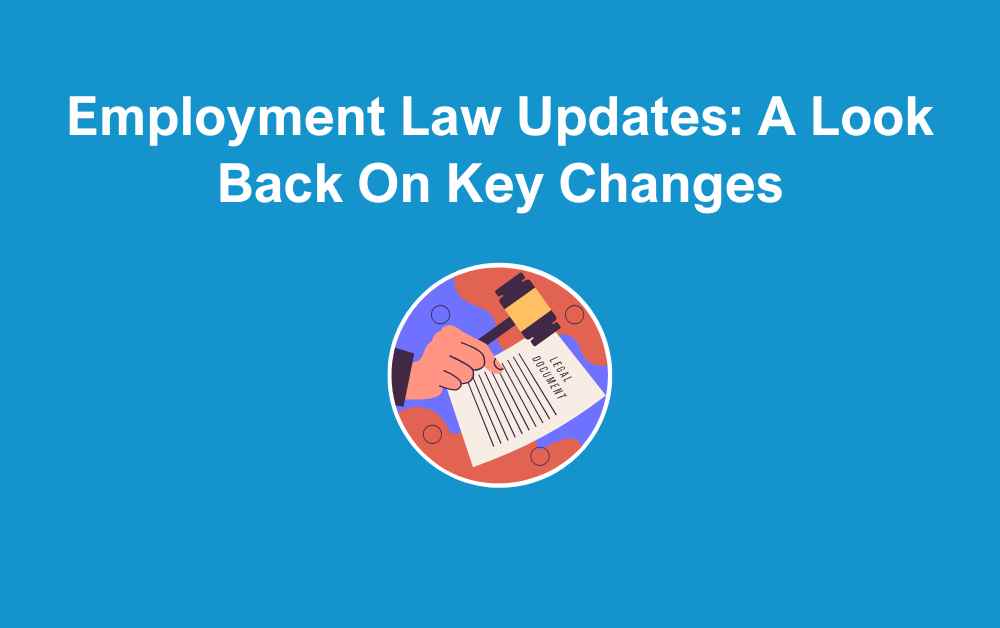It has been a busy year when it comes to UK employment law updates. From the new sexual harassment duty to employment rights bill, the new carers leave act, and flexible working updates, the world of employment legislation hasn’t stopped.
As we approach the end of the year, we thought we would take a look back on the key changes.
Holiday Pay Update
One of the first UK employment law updates of the year was the holiday pay changes. From 1 January 2024, the government made changes to the Working Time Regulations 2024 to simplify the calculation of holiday pay for irregular hours and part-year workers.
For leave years starting on or after 1 April 2024, holiday pay for irregular hours and part-year workers will now be calculated as 12.07 per cent of the actual hours worked in a pay period. This it in an attempt to make calculating holiday pay for part-time and irregular-hours workers easier and fairer.
These reforms follow the 2019 Supreme Court ruling in Harpur v Brazel. This case determined that part-year workers on permanent contracts were entitled to the full 5.6 weeks’ holiday pay received by full-time workers.
Under the new rules, employers can also include an additional amount in a worker’s payslip to cover holiday pay, rather than paying it when annual leave is taken.
New regulations on business transfers
Alongside holiday calculation updates, the Government also introduced new regulations regarding TUPE as part of their employment law updates. This includes (for processes initiated before 1 July 2024) allowing small businesses with fewer than 10 employees are exempt from certain consultation requirements. This is to allow them to consult directly if there’s currently no worker representatives in place. If there are representatives in place, employers must consult with them.
Carer’s Leave Act
From 6th April 2024, the Carers Leave Act officially became part of legislation. This is one of the key UK employment law updates of the year. It means that employees are entitled to one week of unpaid leave every year. This is if they care for dependants with long term needs. Employees must provide a minimum of three days’ notice to take leave. For requests involving more than one day, the notice period must be at least twice the length of the leave requested.
According to the Act, ‘Long term needs’ includes:
- Old age
- Physical or mental illness/injury that could require care for more than three months
- Condition that aligns with the definition of disability, under the Equality Act 2010.
We recently published a blog on Carer’s Leave act and what it involves. You can take a look at it here.
Flexible Working Act
The Flexible Working Act 2023 is one of the UK Employment Law Updates we get asked about the most. This Act grants employees the statutory right to request flexible working arrangements as a day one right. In addition, making it easier for individuals to balance their work and personal lives. Under the Act, employers are obligated to consider these requests seriously. They can only refuse them for specific, legitimate business reasons.
Before this new legislation came in to law on 6 April, employees had to be in employment for at least 26 weeks before making a request.
Employees will also be able to make two requests in a 12-month period. Furthermore, employers will have to make their decision in two months instead of three months. A consultation will have to be put in place to explain the final decision.
This represents a significant shift towards a more adaptable and inclusive working environment. It recognises that employees have diverse needs and circumstances.
New Employment Allocation of Tips Act 2023
Employment Rights Bill
The Employment Rights Bill marks a significant reform to UK employment law updates. It includes key reforms aimed at improving job security, worker rights, and workplace fairness. Proposed changes include making unfair dismissal protections a day-one right, reducing reliance on exploitative zero-hours contracts, and granting employees greater access to flexible working arrangements. Additionally, statutory sick pay will become a day-one entitlement, and parental, paternity, and bereavement leave will be available without service length requirements. The Bill also seeks to enhance protections for employees returning from maternity leave.
For businesses, the Bill introduces new responsibilities that will require policy reviews and operational adjustments to ensure compliance. Employers must prepare for changes to probation periods, flexible working requests, and statutory leave entitlements. Although the Bill is expected to pass through Parliament over the next 18 months, with most changes unlikely to take effect until 2026, organisations are encouraged to begin reviewing their current procedures to align with the anticipated legal framework.
Employment Law Updates 2025 to Keep in Mind
National Living Wage
It’s essential for employers to keep up with these UK Employment Law updates to ensure their employees are paid in compliance with the law. Failure to do so can result in fines and/or legal consequences.
Statutory Sick Pay
The Government has announced statutory sick pay will increase from £116.75 to £118.75 per week in the 2025/2026 financial year. The Lower Earnings Limit, which is the minimum amount employees must earn to qualify for payments such as Statutory Sick Pay, will increase from £123.00 to £125.00 per week.
National Insurance Increase for Employers
The government has announced that the employer National Insurance rate will rise from 13.8 per cent to 15 per cent by April 2025. Alongside this, the threshold for employer NI contributions on a worker’s earnings will be reduced from £9,100 per year to £5,000.
To support smaller businesses, the employment allowance will increase from £5,000 to £10,500. This change means 865,000 employers will pay no National Insurance at all next year, while over one million employers will pay the same or less than they currently do. Additionally, the £100,000 threshold will be removed.
Conclusion
It’s clear that 2024 has brought, and will continue to bring, significant changes to UK employment law updates. From holiday pay and flexible working to the introduction of the Carer’s Leave Act and the Employment Allocation of Tips Act, businesses are facing new responsibilities to ensure compliance and support their employees effectively. The evolving legislative landscape, including the Employment Rights Bill and the new sexual harassment duty, highlights the need for organisations to be proactive in reviewing policies and procedures. Staying informed and prepared will not only ensure compliance but also foster a fair, inclusive, and supportive working environment.
How The HR Booth Can Help
At The HR Booth, we understand that keeping up with employment law updates can be challenging, especially for busy businesses. Our team of experts is here to help you navigate these updates with confidence. Whether it’s reviewing your policies, implementing new processes, or ensuring compliance with legislation such as the Employment Rights Bill, TUPE changes, or the Carer’s Leave Act, we’ve got you covered. We provide tailored advice and practical support to help you manage your workforce effectively and reduce the risk of non-compliance. Contact us today to ensure your organisation is fully prepared for the year ahead.







